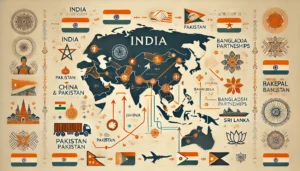India’s inability to take a decisive stance between major powers like Russia, the US, and China is indicative of its geopolitical dilemma. While India refrains from directly confronting Russia, it cannot fully align with the US due to the close alliance between Russia and China, an ever-present rival for India.

By Khuraijam Athouba
India’s historical stance of opportunistic geopolitics is increasingly being exposed in the global arena. The country’s non-aligned policy, once a diplomatic strength, has now become a tool for exploiting the vulnerabilities of other nations. However, this strategy is losing its relevance, as the evolving global dynamics demand sincerity and loyalty from nations striving for long-term alliances.
India’s inability to take a decisive stance between major powers like Russia, the US, and China is indicative of its geopolitical dilemma. While India refrains from directly confronting Russia, it cannot fully align with the US due to the close alliance between Russia and China, an ever-present rival for India. Similarly, Myanmar’s Junta government has grown wary of India’s duplicity, as India aids ethnic armed groups in Myanmar while diplomatically attempting to appease the Junta. Such deceitful tactics are pushing Myanmar to look elsewhere for reliable allies.

Union Home Minister Amit Shah’s recent remark that the Manipur crisis is an “ethnic conflict” only exacerbates the situation. By framing the issue in these terms, the Indian government risks alienating all parties involved, as no group will trust a state that fails to acknowledge its role in fueling the unrest. This shift in narrative may further erode India’s influence in the Northeast and worsen its credibility in the region.
As Myanmar’s internal situation deteriorates and global powers converge in the Indo-Myanmar-Bangladesh theater, India’s lack of loyalty and opportunistic exploitation will come at a steep cost. Betraying the indigenous people of the Northeast has not only destabilized its own borders but has also fostered deep distrust among its neighbors. A nation that lacks sincerity in its alliances and thrives on the suffering of others will eventually find itself friendless on the global stage.
India must reevaluate its geopolitical strategies. Continuing its opportunistic approach will alienate allies, embolden rivals, and ultimately diminish its standing in a world that increasingly values trust and reliability.
India has no true friends on the global stage, only transactional business partners. It is deeply shameful that a country once actively assisting Myanmar in elections and internal affairs has now lost the trust of the Myanmar government due to its deceitful attitude during the recent crisis. Myanmar has chosen to explore alternatives, leaving India sidelined.
This shameful trend extends to India’s internal affairs, particularly in Manipur and the Northeast region. India is losing the trust and goodwill of the indigenous people in the Northeast for the same reasons, opportunism and betrayal. A nation that prioritizes short-term gains over genuine relationships will inevitably find itself isolated, both internationally and within its own borders.
The same article is available at https://x.com/Paari_Athouba/status/1868502478247133598
(Khuraijam Athouba is Working-President of International Peace and Social Advancement, Manipur and spokesperson of COCOMI)
